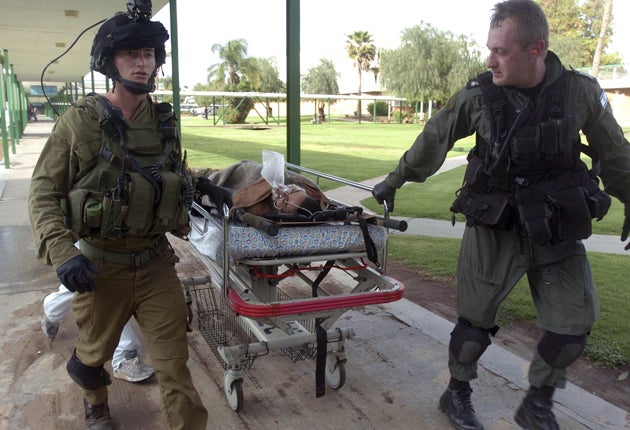Israeli troops die on Gaza border as cabinet meets
Ministers discuss response to US pressure over East Jerusalem settlements

Two Israeli soldiers and two Palestinian militants were killed yesterday during fierce exchanges of gunfire across the Gaza border in one of the worst ground-fighting incidents since the offensive in the territory last year.
The bloodshed came as the Israeli Prime Minister Benjamin Netanyahu was holding a crucial meeting of his inner cabinet to consider US demands for confidence-building measures to help bring the moderate Palestinian leadership into political negotiations.
The Israeli military said the soldiers were killed, and two others injured, in the exchanges after troops opened fire at "terrorists who were planting explosives along the security fence in the southern Gaza Strip". The deaths, along with that of a soldier killed last week near the Gaza border by friendly fire, are the first Israeli military deaths since January last year.
Unusually after a year in which Hamas had been seen as seeking to enforce a de facto ceasefire, the Islamic faction's military wing said that its gunmen had been involved. Its spokesman Abu Obeida said that Israeli forces "fell into an ambush" east of Khan Younis. Officials in Gaza's Hamas-run Interior Ministry reported fire from Israeli artillery, tanks and a helicopter gunship. Local medics reported five Palestinians wounded; Al Arabiya Television showed residents crowding round ambulances unable to reach the scene because of gunfire.
Yesterday's meeting of Israel's security cabinet broke up without an official statement and is likely to be resumed after the Sabbath. A statement said that both internal discussions and talks with the US would continue. It followed a week of high tension that reached a peak with Mr Netanyahu's meeting with US President Barack Obama on Tuesday night. The crisis in US-Israeli relations, which originally blew up over Israel's plan to build another 1,600 homes in the Ramat Shlomo settlement, has since widened.
Israel's government is facing a series of demands by a sceptical Washington administration for measures designed to show it is serious about negotiating a peace deal with the Palestinians. Officials suggested before the inner cabinet meeting that two of the main sticking points remained: US demands for a curb on settlement construction in East Jerusalem, and for an extension of the partial freeze on settlements in the West Bank beyond September.
Shortly before yesterday's meeting Mr Netanyahu's office said: "The Prime Minister's position is that there is no change in Israeli policy on Jerusalem." He has consistently maintained that Israel has a right to build Jewish housing in East Jerusalem, which it unilaterally annexed after the 1967 Six Day War – a step never accepted by the international community.
Israel's President Shimon Peres hinted this week at a possible compromise where Jewish settlement in inner-city Arab areas of Jerusalem might slow but not in outlying so-called "Jewish neighbourhoods" beyond Israel's 1967 border. But it was far from clear that even that would be acceptable to cabinet hardliners who want unrestrained building across East Jerusalem. While the Defence Minister Ehud Barak and the Deputy Prime Minister Dan Meridor are said to favour going as far as possible towards meeting US demands, hardliners, such as Foreign Minister Avigdor Lieberman and Mr Netanyahu's Likud colleague Benny Begin are said to be in the rejectionist camp.
The tone of this week's diplomacy was set by 90 minutes of talks on Tuesday at the White House which were adjourned by President Obama so he could dine with his wife and daughters.
The President reportedly told Mr Netanyahu to contact him if there was "something new". It prompted one commentator to say that Mr Netanyahu had been treated like the President of Equatorial Guinea.
Subscribe to Independent Premium to bookmark this article
Want to bookmark your favourite articles and stories to read or reference later? Start your Independent Premium subscription today.

Join our commenting forum
Join thought-provoking conversations, follow other Independent readers and see their replies